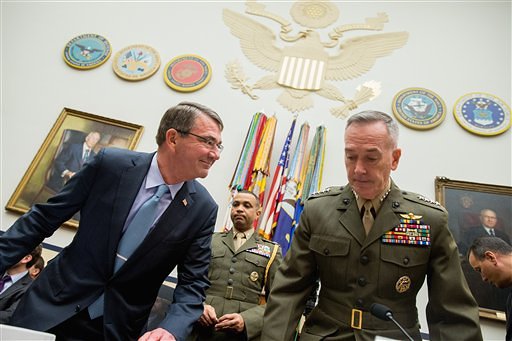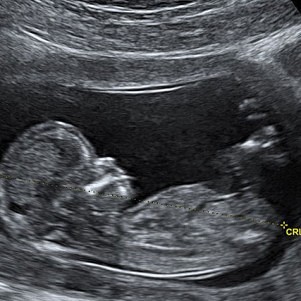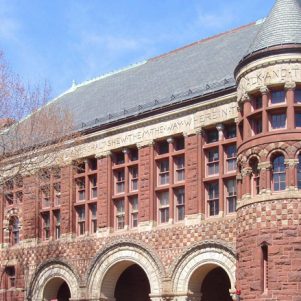At Harvard, Defense chief predicts generational battle against terror
By Derrick Perkins | December 1, 2015, 21:27 EST
 Defense Secretary Ash Carter, left, and Joint Chiefs Chairman Gen. Joseph Dunford Jr. arrive on Capitol Hill Tuesday, where both testified before the House Armed Services Committee. (AP photo by Andrew Harnik)
Defense Secretary Ash Carter, left, and Joint Chiefs Chairman Gen. Joseph Dunford Jr. arrive on Capitol Hill Tuesday, where both testified before the House Armed Services Committee. (AP photo by Andrew Harnik) CAMBRIDGE – Grappling with violent extremism will be a key challenge facing Americans for generations to come, U.S. Secretary of Defense Ash Carter said at the Harvard Kennedy School Tuesday, hours after telling a congressional committee that more special forces were being deployed in Iraq to fight Islamic State.
The special operations troops will fight with the Iraqi military and have the capability to launch unilateral strikes into Syria, Carter said at a hearing of the Armed Services Committee of the House of Representatives. He characterized the increase as a component of the Pentagon’s heightened efforts to battle Islamic State forces, calling the terrorist organization by an acronym, ISIL.
“We have to defeat ISIL; we will defeat ISIL,” Carter said at the Kennedy School. “We are constantly seeking and finding new ways to strike ISIL and also to protect ourselves.”
The new force’s missions include capturing or killing terrorist leaders, rescuing hostages and gathering intelligence, Carter said. A former Harvard University professor, Carter came back to the Kennedy School for a wide-ranging discussion about foreign affairs and defense policy.
U.S. special forces also will work with local groups in Syria, Carter told the congressional hearing before departing for Boston. Doing so will help ensure the success of a post-Islamic State nation and prevent the rise of other extremist groups, he said in his testimony.
“We’re at war. We are using the might of the finest fighting force the world has ever known,” Carter said in Washington. “Tens of thousands of U.S. personnel are operating in the broader Middle East region, more are on the way. We have some of our most advanced air and naval forces attacking ISIL. U.S. troops are advising and assisting ground operations in Syria and Iraq.”
The influx of special operations forces will augment U.S. personnel already serving in Iraq. One American, Army Master Sgt. Joshua Wheeler, 39, died during an October raid to free hostages in the northern part of that country. Earlier, President Barack Obama sent fewer than 50 special operations troops to Syria, to serve as advisers to allies fighting Islamic State forces in that war-torn country.
It’s a battle the U.S. can’t fight alone, Carter said at the Kennedy School, with a nod to increased participation from France – and potentially the U.K. – following last month’s terrorist attacks in Paris, which Islamic State said it had perpetrated. More support is needed from our allies in the Middle East and even Russia – if that nation changes its approach, Carter said.
Russia, which has publicly committed to defeating the Islamic State, has largely limited its military operations in Syria to attacking rebel forces there, not Islamic State, Carter told the congressional panel. “It is time for Russia to focus on the right side of this fight,” he added.
“The Russians got off on the wrong foot on this,” Carter said later, at the school in Cambridge, describing Russia’s backing of embattled Syrian leader Bashar al-Assad, a long-time ally of Moscow in the region. “They were doing something that not only was wrongheaded but backwards.”
He spoke optimistically of attempts to convince the Russians to reevaluate their stance and described Syria as one place where the U.S. could work with its former Cold War rival.
“We need to be continually willing to work with them where it is appropriate to work with them,” Carter said.











